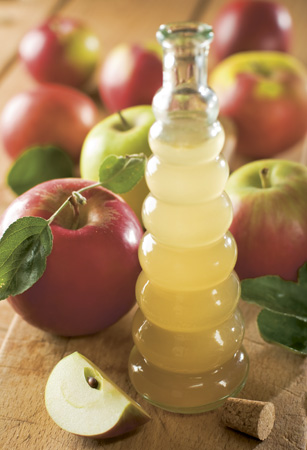 Vinegar has been used for all sorts of things for thousands of years, including industrial, medical and domestic uses, some of which are still used today. It is the oldest storable food and because it can be stored for an almost unlimited period, it is the only food without an expiry date. The ancient Babylonians around 5,000 BC were among the first to recognize the versatile nature of vinegar and used it as both a preserver and a condiment. They were also the first to flavour vinegar with herbs and spices and use it in their cooking. I will be looking at some fantastic culinary tricks using vinegar, as well as exploring the best ways to use it around the kitchen and home for cleaning and some ways it can benefit your health. It really is surprising how much you can use vinegar for!
Vinegar has been used for all sorts of things for thousands of years, including industrial, medical and domestic uses, some of which are still used today. It is the oldest storable food and because it can be stored for an almost unlimited period, it is the only food without an expiry date. The ancient Babylonians around 5,000 BC were among the first to recognize the versatile nature of vinegar and used it as both a preserver and a condiment. They were also the first to flavour vinegar with herbs and spices and use it in their cooking. I will be looking at some fantastic culinary tricks using vinegar, as well as exploring the best ways to use it around the kitchen and home for cleaning and some ways it can benefit your health. It really is surprising how much you can use vinegar for!
Cleaning Around The Home
As a cleaning substance, white vinegar makes an excellent, economical and eco-friendly alternative to many chemical cleansers. The acetic acid content is enough to cut through grease and grime, but it is also bactericidal, making it effective against most moulds, bacteria and germs.
The reason we sprinkle vinegar on our fish and chips is not just because it tastes good, but because it cuts through the grease, making the food easier to digest. Tackle grease marks and splatters on surfaces around the home with a cloth dampened in a solution of equal parts white vinegar and water. Not only will it get rid of the grease, the vinegar will also remove any lingering ‘fatty smells’ – once its own scent has evaporated.
It can also be used on chopping boards as it is effective against harmful bugs, such as E. Coli, Salmonella and Staphylococcus. You can clean down wooden and plastic cutting boards, butcher blocks and non-marble counter tops where food preparation takes place with undiluted white vinegar before and after use. If wooden surfaces need deodorizing after cooking, sprinkle them with bicarbonate of soda (baking soda) and spray on some vinegar. Let it foam for a couple of minutes, then rinse with clean water.
Vinegar can also be used on limescale and mineral deposits that have built up in kettles – and in coffee makers and steamers as well. All you need to do to shift them is boil up enough white vinegar to fill the pot to 3⁄4 full for 5 minutes. Leave the vinegar in the kettle, steamer or coffee maker overnight and then rinse out with cold water in the morning.
This can also apply to the bathroom as well, to tackle limescale stopping your shower head or tap from working. You can submerge a removable shower head in a bowl of white vinegar and very hot water, and leave it to sit for an hour or so. The vinegar will dissolve and shift the mineral deposits. Fixed shower heads – as well as bath and basin taps – are a bit more tricky: fill a plastic bag with neat white vinegar and fasten it with tape, string and rubber bands over the shower head. This works for taps too, but you can also try fixing a plastic cup over the end! Let the tap sit in the vinegar, and then rinse off with cold water.
Culinary Tricks 
Vinegar should of course be found in your kitchen, and not just for cleaning purposes. It is a great ingredient when cooking, too. A couple of tricks that I've learnt along the way to make preparing meals just that little bit easier: to get the perfect poached eggs add a few drops of distilled white or white wine vinegar to the water when poaching, which will help to keep the egg white intact. This can also be used when boiling eggs to prevent them from cracking and unexpectedly spoiling your breakfast. Just two teaspoons full of vinegar added to the water will do the trick.
Another tip that I have found useful when marinating meat for a BBQ or when cooking a casserole is to use vinegar to help make the meat nice and tender. You can also use 1 tablespoon of red wine or cider vinegar mixed in with your marinade sauce, stock or gravy and your meat should be incredibly tender to eat.
You can also add 1–2 tablespoons of vinegar to de-glaze a frying pan or roasting tin. (Adding liquid to the dried and caramelized meat juices in the pan after cooking meat provides a delicious jus or gravy.)
Health and Personal Care
Keeping healthy can sometimes be an uphill struggle, even when you are eating all of the fruit and vegetables you can. Vinegar can be helpful for those small ailments that sometimes get on top of you.
For example, congestion caused by a cold or sinus infection can be eased by a ‘steam treatment’. Just put 120 ml/4 fl oz/1⁄2 cup white vinegar into a heatproof bowl and pour on some boiling water. Breathe in the steam-vapour and put a towel over your head to keep the steam ‘focused’. You should feel the congestion shift within a couple of hours.
Spots are another common problem that occur sometimes, particularly in periods of stress or worry. Spots and pimples are caused by excess sebum (the natural oil excreted by the skin’s sebaceous glands) that blocks up the pores and hair follicles, leading to blackheads and whiteheads. Apple cider vinegar can help clear the complexion by balancing the skin’s pH level and absorbing excess oil from the skin. A dilute solution of 1 part apple cider vinegar and 3 to 4 parts water applied three times a day to the skin and left there for 10 minutes or so before rinsing off will help clear the complexion.
You can even use vinegar for the more luxurious side of taking care of yourself. The use of vinegar as a skin toner dates back to the ancient Egyptians. After cleaning your face, add 1 tablespoon apple cider vinegar to a basin of cool water and rinse. You will notice any residual grease from make-up and make-up removers disappear and your skin is cooled, toned and feels a little ‘tighter’. Similarly apple cider vinegar added to a soaking bath – or even vinegar-soaked ‘bandages’ wrapped around knees and elbows and left on overnight – are the ‘lazy way’ to deal with rough or hard skin. Once dry you can gently rub the areas with a pumice stone in small circular motions to remove dead skin.
Our book Vinegar: House & Home by Maria Constantino (ISBN: 9781783612765) has invaluable sections on how to use vinegar in laundry, pet care, gardening and of course in the kitchen and around the home. There are also lots of salad dressing recipes provided, as well as chutneys, starters, main courses and desserts for you to try out. You can find the book on Amazon here.
Links
-
Many, many more tips and tricks for using Vinegar around the home can be found here.
-
Check out these fantastic recipes using white wine vinegar on the BBC Good Food website.
-
To have a browse of some great high quality vinegars and oils to create dressings and dips visit Oil & Vinegar.




